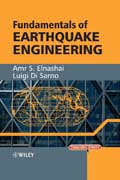
Earthquake engineering has become more interdisciplinary, requiring expertisefrom engineering seismologists, geotechnical and structural engineers, architects, construction firms, and experts in risk management. Yet the tremendous advances in earthquake engineering research are not reflected in current textbooks. Earthquake Engineering focuses on the principles and concepts essential to earthquake engineering methodologies under development today, covering both new and advanced concepts. Topics discussed include deformation-based assessment and design; fragility analysis; advanced retrofitting; displacement spectraas demand description; and the use of full-scale tests and field observationsto understand seismic performance. An ideal instructional text, the book includes problems to be used as homework together with some solved examples, and aSolutions Manual. An accompanying CD/Web site contains some simple programs for strong-motion and spectra as well as structural response analysis.
- ISBN: 978-0-470-02483-6
- Editorial: John Wiley & Sons
- Encuadernacion: Cartoné
- Páginas: 400
- Fecha Publicación: 26/09/2008
- Nº Volúmenes: 1
- Idioma: Inglés
